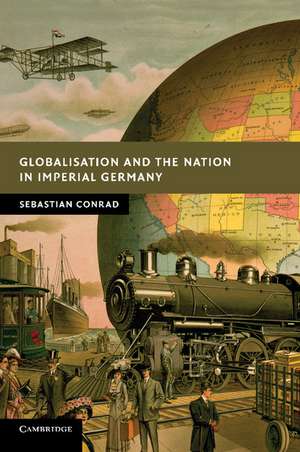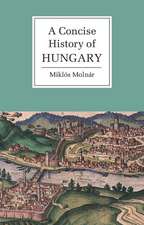Globalisation and the Nation in Imperial Germany: New Studies in European History
Autor Sebastian Conrad Traducere de Sorcha O'Haganen Limba Engleză Paperback – sep 2010
| Toate formatele și edițiile | Preț | Express |
|---|---|---|
| Paperback (1) | 241.90 lei 3-5 săpt. | |
| Cambridge University Press – sep 2010 | 241.90 lei 3-5 săpt. | |
| Hardback (1) | 496.31 lei 6-8 săpt. | |
| Cambridge University Press – sep 2010 | 496.31 lei 6-8 săpt. |
Din seria New Studies in European History
-
 Preț: 177.91 lei
Preț: 177.91 lei -
 Preț: 238.02 lei
Preț: 238.02 lei -
 Preț: 208.50 lei
Preț: 208.50 lei -
 Preț: 398.42 lei
Preț: 398.42 lei -
 Preț: 237.92 lei
Preț: 237.92 lei - 9%
 Preț: 593.91 lei
Preț: 593.91 lei -
 Preț: 180.06 lei
Preț: 180.06 lei - 9%
 Preț: 592.61 lei
Preț: 592.61 lei -
 Preț: 169.70 lei
Preț: 169.70 lei -
 Preț: 211.13 lei
Preț: 211.13 lei -
 Preț: 166.99 lei
Preț: 166.99 lei -
 Preț: 266.53 lei
Preț: 266.53 lei -
 Preț: 429.99 lei
Preț: 429.99 lei -
 Preț: 400.05 lei
Preț: 400.05 lei - 11%
 Preț: 698.50 lei
Preț: 698.50 lei -
 Preț: 275.85 lei
Preț: 275.85 lei -
 Preț: 330.09 lei
Preț: 330.09 lei - 11%
 Preț: 695.93 lei
Preț: 695.93 lei -
 Preț: 423.10 lei
Preț: 423.10 lei -
 Preț: 340.13 lei
Preț: 340.13 lei - 11%
 Preț: 698.30 lei
Preț: 698.30 lei -
 Preț: 326.82 lei
Preț: 326.82 lei -
 Preț: 339.37 lei
Preț: 339.37 lei -
 Preț: 396.59 lei
Preț: 396.59 lei -
 Preț: 383.48 lei
Preț: 383.48 lei -
 Preț: 292.40 lei
Preț: 292.40 lei - 14%
 Preț: 682.94 lei
Preț: 682.94 lei -
 Preț: 282.75 lei
Preț: 282.75 lei -
 Preț: 417.07 lei
Preț: 417.07 lei -
 Preț: 437.18 lei
Preț: 437.18 lei - 14%
 Preț: 873.67 lei
Preț: 873.67 lei -
 Preț: 420.40 lei
Preț: 420.40 lei -
 Preț: 319.99 lei
Preț: 319.99 lei - 14%
 Preț: 687.39 lei
Preț: 687.39 lei -
 Preț: 397.01 lei
Preț: 397.01 lei - 11%
 Preț: 695.93 lei
Preț: 695.93 lei - 11%
 Preț: 543.84 lei
Preț: 543.84 lei
Preț: 241.90 lei
Nou
Puncte Express: 363
Preț estimativ în valută:
46.29€ • 48.67$ • 38.25£
46.29€ • 48.67$ • 38.25£
Carte disponibilă
Livrare economică 27 martie-10 aprilie
Preluare comenzi: 021 569.72.76
Specificații
ISBN-13: 9780521177306
ISBN-10: 0521177308
Pagini: 506
Ilustrații: 9 b/w illus. 6 maps
Dimensiuni: 152 x 229 x 26 mm
Greutate: 0.82 kg
Editura: Cambridge University Press
Colecția Cambridge University Press
Seria New Studies in European History
Locul publicării:Cambridge, United Kingdom
ISBN-10: 0521177308
Pagini: 506
Ilustrații: 9 b/w illus. 6 maps
Dimensiuni: 152 x 229 x 26 mm
Greutate: 0.82 kg
Editura: Cambridge University Press
Colecția Cambridge University Press
Seria New Studies in European History
Locul publicării:Cambridge, United Kingdom
Cuprins
Introduction; 1. German globalisation around 1900; 2. 'Native policy' in the colony and the metropole: 'educating to work' in East Africa and east Westphalia; 3. Between the poles: mobility and nation in Germany's 'real colony'; 4. The politics of segregation: Chinese workers, global networks and the 'colourless peril'; 5. 'Here, the German is not degenerating': Brazil, emigration and the nation's fountain of youth; 6. 'German work'; 7. Regimes of territorialisation and the globalisation of the national; 8. Bibliography.
Recenzii
'No one has done more than Sebastian Conrad to bring global perspectives into the very centerground of historical debate inside Germany. This book demonstrates with compelling concreteness the difference that doing history transnationally can make.' Geoff Eley, University of Michigan, Ann Arbor
'What is impressive about this book is Conrad's range of knowledge about work and migration in the Americas, Asia, Africa as well as Europe and his capacity to use this knowledge to construct a broad but coherent 'global' account of the rise of strong and new kinds of national sentiment and politics and ideology in the German Second Empire.' John Breuilly, London School of Economics and Political Science
'Methodologically innovative, richly researched, and presented in a lively and engaging manner, Globalisation and the Nation in Imperial Germany brings together the history of Germany, its overseas empire in Africa and Asia, and its wider global engagements. By focusing on the complex intersection of practices of labor, racial and national ideologies, and the production of global inequalities, Conrad offers fresh insight not only into the history of Germany but also into the political, economic, and cultural processes that shaped the nineteenth and twentieth centuries and continue to shape the world today.' Andrew Zimmerman, George Washington University
'What is impressive about this book is Conrad's range of knowledge about work and migration in the Americas, Asia, Africa as well as Europe and his capacity to use this knowledge to construct a broad but coherent 'global' account of the rise of strong and new kinds of national sentiment and politics and ideology in the German Second Empire.' John Breuilly, London School of Economics and Political Science
'Methodologically innovative, richly researched, and presented in a lively and engaging manner, Globalisation and the Nation in Imperial Germany brings together the history of Germany, its overseas empire in Africa and Asia, and its wider global engagements. By focusing on the complex intersection of practices of labor, racial and national ideologies, and the production of global inequalities, Conrad offers fresh insight not only into the history of Germany but also into the political, economic, and cultural processes that shaped the nineteenth and twentieth centuries and continue to shape the world today.' Andrew Zimmerman, George Washington University
Notă biografică
Descriere
Translation of award-winning study of the development of German nationalism in a global context.
















